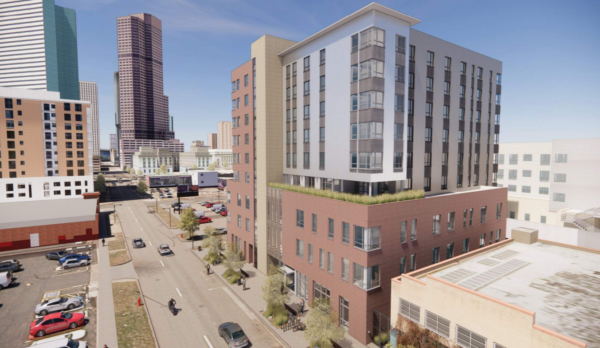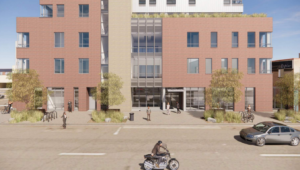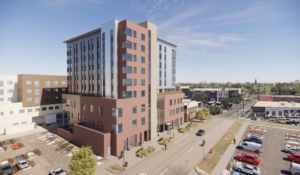The Stout Street Health Center is poised to get some company.
The Colorado Coalition for the Homeless, which completed the healthcare facility at 2130 Stout St. in 2014, now is planning a nine-story project across the alley from it on what is currently a parking lot at 2175 California St.
Plans call for the second and third floor of the structure to be a “recuperative care” facility, with 75 beds. The fourth through ninth floors will have 98 income-restricted apartments, about half of them for those earning up to 30 percent of the area median income.
Coalition President and CEO John Parvensky, who has led the organization for 35 years, said the recuperative care beds are an attempt to address a common scenario. A homeless person goes to the hospital and receives treatment, but then “because of their homeless status, they cannot safely be discharged to the streets or even a shelter” because some amount of ongoing care is needed.
That ongoing care could be that the individual needs to be on oxygen, or simply that they need a daily wound check.
“More and more of the shelters are being asked to take people that they don’t have the capacity to provide adequate medical oversight,” Parvensky said.
The idea with the recuperative beds is to allow those individuals to leave the hospital for a place that can still provide care, and also work to ensure they have access to health care in the future.
The second floor of the building will have 50 beds, intended for individuals staying 30 to 45 days. The 25 beds on the third floor will be for those who might stay longer than 45 days.
The proposed structure goes before the Downtown Design Advisory Board for a second time this week.
The 2175 California St. parcel, which the coalition owns, is 0.43 acres. Parvensky said the placement of the project by the Stout Street Health Center, which also has housing above its clinic space, was intentional.
“Last year we served about 10,000 unique patients there,” he said.
Parvensky said nailing down financing for the California Street project was a challenge. The structure will ultimately have three owners, he said, because three different financing mechanisms are being used: low-income housing tax credits, private activity bonds and new markets tax credits.
“Putting all three of those pieces together, it’s not for the faint of heart,” he said.
Parvensky said he knows there is some concern about the amount of services and facilities in Arapahoe Square intended for low-income and homeless individuals, but design-wise, “most people will pass by it and think it’s one of the new residential projects in the neighborhood.”
In addition to the Stout Street Health Center, the coalition also completed Renaissance Downtown Lofts in 2018 at 2075 North Broadway, a short distance away. Parvensky said he’s also glad to see that hundreds of market-rate apartments have been completed within two blocks of both projects in recent years.
Parvensky said the nonprofit hopes to break ground on the California Street project by the end of the year, and expects it will take 18 months to build. Christopher Carvell Architects drew up the project plans.
The Stout Street Health Center is poised to get some company.
The Colorado Coalition for the Homeless, which completed the healthcare facility at 2130 Stout St. in 2014, now is planning a nine-story project across the alley from it on what is currently a parking lot at 2175 California St.
Plans call for the second and third floor of the structure to be a “recuperative care” facility, with 75 beds. The fourth through ninth floors will have 98 income-restricted apartments, about half of them for those earning up to 30 percent of the area median income.
Coalition President and CEO John Parvensky, who has led the organization for 35 years, said the recuperative care beds are an attempt to address a common scenario. A homeless person goes to the hospital and receives treatment, but then “because of their homeless status, they cannot safely be discharged to the streets or even a shelter” because some amount of ongoing care is needed.
That ongoing care could be that the individual needs to be on oxygen, or simply that they need a daily wound check.
“More and more of the shelters are being asked to take people that they don’t have the capacity to provide adequate medical oversight,” Parvensky said.
The idea with the recuperative beds is to allow those individuals to leave the hospital for a place that can still provide care, and also work to ensure they have access to health care in the future.
The second floor of the building will have 50 beds, intended for individuals staying 30 to 45 days. The 25 beds on the third floor will be for those who might stay longer than 45 days.
The proposed structure goes before the Downtown Design Advisory Board for a second time this week.
The 2175 California St. parcel, which the coalition owns, is 0.43 acres. Parvensky said the placement of the project by the Stout Street Health Center, which also has housing above its clinic space, was intentional.
“Last year we served about 10,000 unique patients there,” he said.
Parvensky said nailing down financing for the California Street project was a challenge. The structure will ultimately have three owners, he said, because three different financing mechanisms are being used: low-income housing tax credits, private activity bonds and new markets tax credits.
“Putting all three of those pieces together, it’s not for the faint of heart,” he said.
Parvensky said he knows there is some concern about the amount of services and facilities in Arapahoe Square intended for low-income and homeless individuals, but design-wise, “most people will pass by it and think it’s one of the new residential projects in the neighborhood.”
In addition to the Stout Street Health Center, the coalition also completed Renaissance Downtown Lofts in 2018 at 2075 North Broadway, a short distance away. Parvensky said he’s also glad to see that hundreds of market-rate apartments have been completed within two blocks of both projects in recent years.
Parvensky said the nonprofit hopes to break ground on the California Street project by the end of the year, and expects it will take 18 months to build. Christopher Carvell Architects drew up the project plans.




Leave a Reply